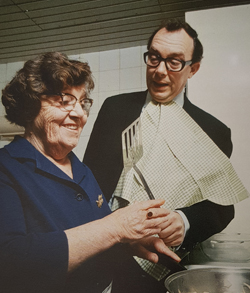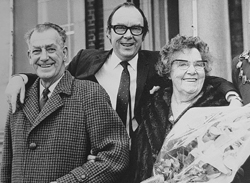The Woman Behind Morecambe and Wise
2009 Article

Eric and Sadie

George, Eric and Sadie
This is an edited version of the article, updated for this website by Paul Jenkinson.
A second-class train ride from Coventry to Birmingham is not the most obvious starting point for the best-loved double act in British comedy history.
And yet it was on this dreary, 21-mile journey in 1940 that the seeds of future greatness were sown.
Travelling were one Sadie Bartholomew, her 14-year-old son Eric, and his friend Ernest Wiseman.
The teenagers had been performing in a touring youth theatre – singing, dancing, telling jokes – though always individually, never thinking to combine their talents.
As usual, the boys were over-excited after the show and Sadie, who was trying to sleep, made an off-the-cuff suggestion that would change showbiz history for ever.
“Can’t you two find something to do?” she asked. “Why don’t you rehearse some gags for a double act?”
Behind every great man, so they say, is a great woman. And in the case of Eric Morecambe, once voted the funniest British star of the 20th century, that great woman was his mum.
As a play celebrating the early careers of Eric Morecambe and Ernie Wise tours the country after a critically acclaimed season at the Edinburgh festival, the extraordinary role which Eric’s mother Sadie played in shaping the double act is only now beginning to emerge.
Playwright Tim Whitnall has worked closely with the Morecambe family and the centrepiece of the play is an emotional letter written to the 21-year-old Eric by Sadie in which she calls her son by her favourite nickname: Sunshine.
Bring Me Sunshine would later become Eric and Ernie’s signature tune.
But the influence of Sadie went far beyond a spontaneous remark on a train or even inspiration for Morecambe and Wise’s most famous song.
It was Sadie who drove Eric into showbusiness, her tenacity that saw him continue to plug away at it, and her keen vision that saw just what her son and his friend could achieve.
“Considering how enormous her contribution to Morecambe and Wise was, there’s surprisingly little known about Sadie,” says Paul Jenkinson, who runs website morecambeandwise.com.
“It’s a shame because she really was instrumental in both Eric entering showbusiness and in the coming together of Eric and Ern.
“She nurtured Eric’s talents from a very early age. She spotted something in him that no one else at that time really saw.
"His school reports generally said he wouldn’t do well but she encouraged him to enter talent contests, to become an entertainer.
“She was fiercely ambitious. She wanted a better standard of living for her son than she and husband George could give him.
“There are comics and comics. He was just naturally funny, that’s not something you can teach. Sadie saw that, though she encouraged him to develop his own natural funniness.”
Eric Morecambe was born John Eric Bartholomew in May 1926 in Buxton Street, Morecambe. It would be years before he would name himself after the town and when he did, inevitably, it was Sadie’s idea.
Eric in later years with father George and mother Sadie
He was brought up the only child of Sadie and George and life in the Bartholomew household was tough.
This did not deter Sadie, however, who once claimed that even as a three-year-old, Eric was a born entertainer, never passing up the opportunity to perform a song and dance at family gatherings.
George was a labourer with the Morecambe Corporation and his meagre income was supplemented by Sadie’s work as a cleaner.
She was determined, however, to forge a better life for her only son, declaring she didn’t want him “tied to a factory whistle” like his father, and so she took on extra work as an usherette in order to pay for her child to take dance classes and lessons in piano and clarinet.
Her energy and determination is still remembered by Eric’s daughter Gail who recalls: “Sadie was a fascinating character.
She was tiny but she had a raucous laugh and a sharp tongue, would always call a spade a spade. I think in another era she would have been famous for something herself.
She read and read. She didn’t really watch television at all. She was always immersed in a book.
“She was a real character. People refer to my Dad as a genius - and that word does get bandied around a lot now - but I’ve often thought that being a genius can be due to the fact of having certain other individuals around that enable it.”
B y the age of 10, the investment was paying off. Eric was indeed showing promise as an entertainer, even securing paid gigs at the working men’s clubs.
As word began to spread, Sadie entered him for talent contests and in 1939 he won the local leg of a nationwide competition organised by music magazine Melody Maker.
The prize was an audition with the legendary Jack Hylton, whose shows were the top attraction of the day.
Sitting with Hylton as the 13-year-old Eric Bartholomew went through his act, was his latest child star - one Ernest Wiseman, a short, confident Leeds boy.
It was the first time the future double act had laid eyes on each other and the initial signs were not promising.
Ernie was impressed enough, so impressed, in fact, to be worried.
As he later remembered: “The boys in the band turned to me and said, ‘Bye then, Ernie. Things won’t be the same with this new kid around. What are you going to do now?’”
The wariness was mutual. “At the same time, Eric wasn’t too keen on Ern at first,” explains Jenkinson.
“Ernie may have been Hylton’s big star but to Eric he was just a boy of his own age and he was thinking, who are you to sit there and audition me?
"There was a definite rivalry there. Of course later on, when they toured together as individual acts, they became best friends and in a way that was down to Sadie too.”
Within a year the two were performing separate acts in a touring revue called Youth Takes A Bow and quickly laid aside their initial rivalry.
Sadie, who travelled everywhere with her son, invited Ernie to share their digs, the two boys often even having to share a bed, and the three became a team.
It was during this period, after a show in Coventry, that Sadie first suggested that they pair up to form a double act.
The initial remark may have been born out of her desire for a bit of peace and quiet on the train journey back to Birmingham but for the boys it was an obvious way to combine their talents.
They immediately started rehearsing, putting together sketches, song and dance routines, even the semi ad-libbed flights of fancy for which they would become so famous.
Bartholomew and Wise became a hit but for Sadie there was still one problem. After a gig in Nottingham, Eric later remembered how his mother put the final piece of the jigsaw together.
“My mother was talking to Adelaide Hall, the coloured American singer on the bill,” he recalled, “and explaining to her how nobody liked the name Bartholomew and Wise.
"Adelaide’s husband, Bert Hicks, overheard and said that he had a friend who called himself Rochester because he came from Rochester, Minnesota.”
Bert asked Sadie where she came from. “Morecambe,” she replied, before thinking for a moment. “Morecambe and Wise. That has a ring to it.”
Eric later said that he always preferred Morecambe and Leeds, but Sadie thought it sounded too much like a bus tour.
The newly-named fledgling double act was put on hold, however, as both boys were conscripted in 1943: Ernie went into the Merchant Navy, Eric became a Bevin Boy, working in a coal mine in Accrington, from which he was invalided out after 11 months due to the discovery of a heart defect.
After the war, Sadie was determined that Morecambe and Wise should once again take to the stage.
Working from her council house in Morecambe, she acted as their agent, tirelessly pestering theatres and promoters to find them work, then accompanying the boys on endless trips to London to perform.
“Sadie was totally unusual for her era,” says Eric’s widow Joan Morecambe.
“She spotted their talent and just went for it. [Eric’s father] George was unusual for that time too because he was happy for his wife to do that.”
Paul Jenkinson agrees that her energy and ambition were extraordinary.
“Women simply weren’t like she was in the Forties,” he says. “They were supposed to stay at home and look after their husband and children.
"But she was very smart, very dynamic and very ambitious. Her attitude was that she was going to do everything she could to make sure Eric fulfilled his potential.
“She acted as their agent throughout their early career, booking them gigs, travelling round all the theatres with them, taking them to shows, sharing digs. And she kept it up right until the double act really took off and they were getting exposure on the radio and TV.”
By 1950 the boys had secured a professional agent and within two years were regulars on the BBC radio show Variety Fanfare. It was only then that Sadie allowed herself to relax.
“Once they were really established it was like she felt her contribution was over. She’d done all she could,” says Jenkinson.
Gail Morecambe remembers that her grandmother, still fiercely protective of her son, felt she had one more duty to perform before letting go of Eric’s career completely.
“I think Sadie handed him over to Ernie,” she says. “Like she was saying - here you are, now he’s your responsibility.”
Many thanks to Dominic Utton for allowing us to use this article.© Daily Express / Dominc Utton 2009